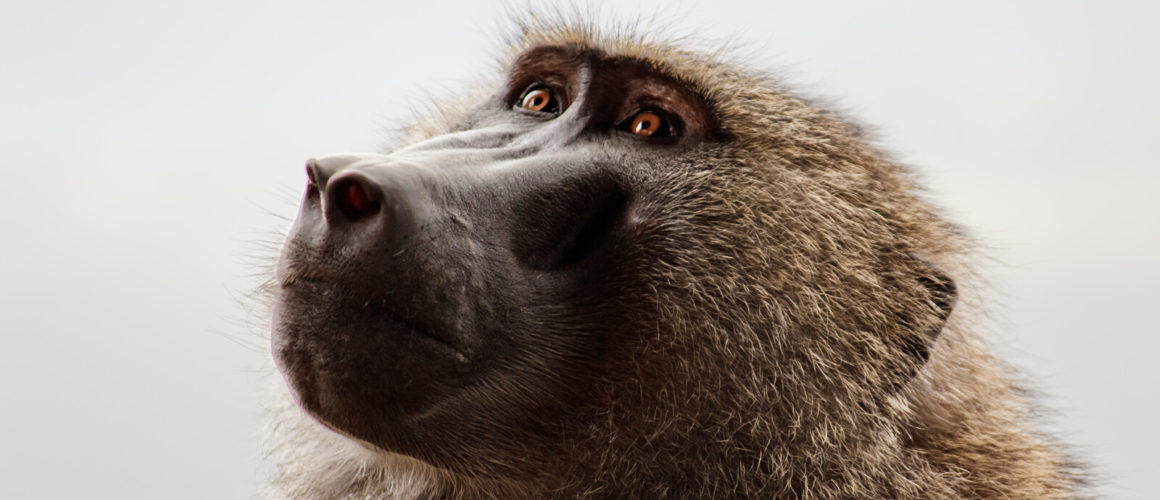A year on from the infamous great baboon ‘escape’, we are still waiting for answers.
On 25 February 2020, 3 baboons escaped from a truck while being transported from a primate breeding colony to the Royal Prince Alfred Hospital (1). The ensuing media attention brought the previously hidden industry into the public limelight, raising the question as to just what research on baboons entailed.
The Australian Senate responded with the passing of Motion (2) which called on the
Federal Government to:
(i) ensure national transparency and accountability in the use of animals in research, and
(ii) invest in the methods and technology needed to end the use of animals for research purposes.
However, there has been no concrete actions resulting and primate research continues under a shroud of secrecy. HRA has been able to establish that in 2019 a total of 318 primates were proposed for research projects funded by tax-payers via the National Health and Medical Research Council (NHMRC), including neuro research and viral research. The NHMRC has funded three grants involving some animal- to animal xenotransplantation, using baboons. Baboon research appears to be primarily in the field of reproductive health and xenotransplantation.
However, much remains unknown. As there is no national mandatory system for the collating and publishing of animal use in research statistics, it is not clear just how may primates are being used. When questioned, the NHMRC was unable to confirm the number of baboons killed or caused harm, or many baboons have been located at or taken to the Royal Prince Alfred Hospital between March 2019 and March 2020.
Data for the Wallacia Primate Breeding Colony has been equally challenging to gather, resulting in the Animal Justice Party NSW passed a motion calling for all papers on animal research in NSW to be released (3). These papers are not as yet available to the public.
HRA recently profiled HIV research conducted at the CSIRO facility (4). Through freedom of information requests, it has been disclosed that 24 macaques were killed in this research, with an additional macaque dying for an undisclosed reason. Much of the detail has not been released, which means we cannot evaluate the animal welfare implications and research outcomes, despite the research receiving over $1 million of public funding. HRA spokesperson Rachel Smith states: ‘It is not acceptable for 25 macaques to die and for the research institution involved to obstruct the release of documentation, arguing it is not in the public interest. The Australian public are concerned about the use of primates in research and it is our money that is funding this research’.
It has been argued that primate research is essential to advance human health. However, systematic reviews of primate research indicate that the perceived benefits to humans are overstated. For example, in the field of depression, non-human primate studies were mainly cited by other papers on animal experimentation, which suggests they are mainly contributing to subsequent animal research rather than advances to human healthcare’ depressive research (5).
HRA Chief Executive Officer Rachel Smith questions: ‘Animal research in Australia is approved on a ‘cost-benefit’ assessment. We are assured that there is stringent regulation ensuring the highest standards. However, such statements are meaningless without genuine transparency, which begs the question, what is being hidden, and why?’
HRA is campaigning for a ban on primate experimentation. A petition calling for an end to primate experiments is now at over 100,000 signatures.
Listen to our podcast episode profiling primate research in Australia here.
Ends
1. https://animalfreescienceadvocacy.org.au/baboons-lose-in-their-bid-for-freedom/
2. https://greensmps.org.au/articles/motion-baboons-animal-testing
3. https://www.facebook.com/EmmaHurstMP/videos/584859842180465
4. https://animalfreescienceadvocacy.org.au/macaques-used-in-hiv-antibody-research/
5. https://www.youtube.com/watch?v=Z8FmP7psINQ&feature=youtu.be
6. https://www.change.org/p/the-hon-greg-hunt-mp-ban-primate-experiments
